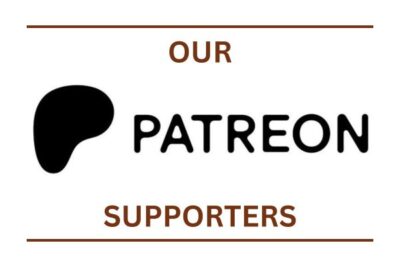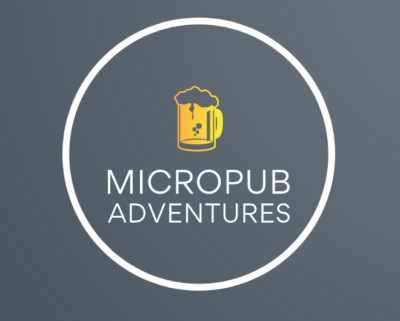When Shane and Alison Parr set up Stonehouse Brewery in 2007 they just wanted to make good sessionable cask ale. Almost 14 years on, they find themselves running a much expanded brewery and diversifying into cider making and distilling whisky, vodka, brandy, and award-winning gin from their quiet corner of north Shropshire. They met the challenge of the coronavirus lockdown head on, quickly growing their bottled business and producing sanitiser. Now they are again looking to the future, despite covid, with new initiatives, investment, and, crucially, renewed optimism.
By Steve Hobman
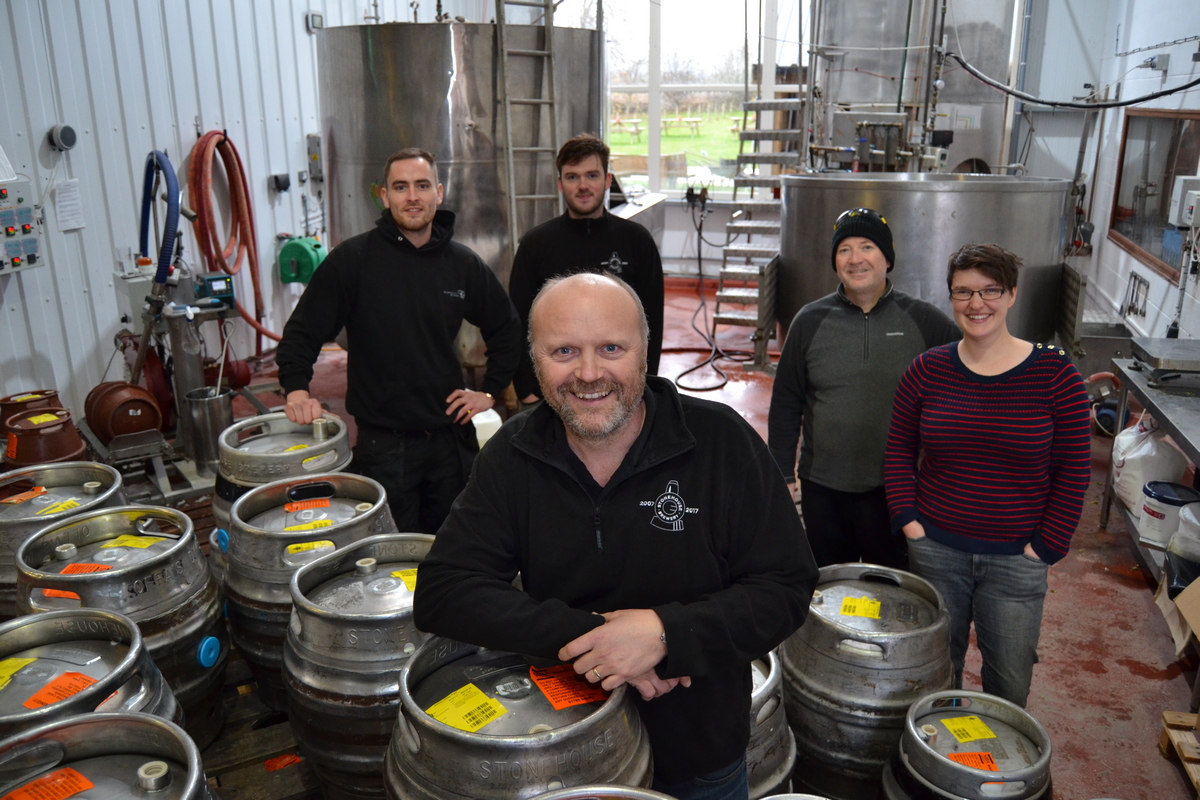
The Stonehouse brewing team
Sipping a pint of fruity Stonehouse Zaffir on a sunny afternoon in the brewery garden, alongside the blooming apple orchard, I may have been forgiven for thinking that the blight of the coronavirus belonged to a parallel world. But no, the brewery tap has the telltale signs — rules boards, direction arrows, sanitiser dispensers — all belying that momentarily delicious illusion.
Nevertheless, there is happiness with the hoppiness in the air at Weston, near Oswestry. One chap smiling is Stonehouse co-founder Shane Parr. Amiable Aussie Shane optimistically launched the brewery with his equally cheery wife and business partner, Alison, back in 2007. Now, several months on since the big black cloud of lockdown descended on the hospitality industry, Shane and Alison are again looking to the future.
During lockdown, planners approved the expansion of the oak-framed brewery tap with car park extension, adding another 30 covers to the 50-seat venue. A spacious 30-seat marquee — purchased for post-lockdown summer business — was also set to be given artificial grass and equipped with heaters and blankets in readiness for the colder weather (capacities will be adjusted under covid rules) and a major investment has been made in the catering kitchen.
The new year gets off with a bang, too, on January 27, seeing the roll-out of 350 barrels of the inaugural whisky from the sibling Henstone Distillery. Launched in 2017 with business partners Christopher and Alexandria Toller, Shane and Alison bought the 1,000-litre still — ‘Hilda’ — from a German distiller. She has already won a raft of serious awards for the gin range, including The Gin Guide’s distillery of the year.
Yet, back on that dark night of Friday, March 20 — when the nation’s pubs were suddenly shut down and with the lion’s share of their business in the on-trade — Shane and Alison went to bed thinking: “This is the end.” Then, with an equally sudden reprieve, the following day saw the take-away rules for pubs and breweries relaxed. “Instantly we were back in business,” recalls Shane.
Serendipitously, Stonehouse had already invested in an efficient bottling line and were able to promptly step up production of the core range beers. Formerly only 10% of turnover, bottle sales quickly doubled through a combination of home delivery, phone-and-collect, and supermarkets.
A family effort
As the excitement mounted, a new website was commissioned for click and collect, only to languish idle throughout the long lockdown as the small team valiantly coped with demand. Normally 13 strong, several staff were furloughed and — despite keeping on a brewer and a bottler: “We were soon struggling to bottle enough,” says Shane. “We had so much local support for pick-up or delivery we dare not switch the website on.”
Even amid this activity, with the distillery at their disposal, Alison suggested producing sanitiser. With help from their local MP, Owen Paterson, through the maze of regulation, they went into production. Supplying hospitals at below cost and selling to locals, no profit was made. But the initiative resulted in “great PR”, further building that crucial customer loyalty.
For Shane, his story of hope and hops began as a home brewer ‘down-under’, aged only 16. A few years later, on his world travels, he fell in love with both cask ale and Alison while working alongside his future bride in a Bristol freight business. Married, they moved to Australia, but with Alison homesick they returned to Shropshire to follow Shane’s passion.
They launched the brewery as a real family effort. Shane, his father-in-law engineer Ian Reid, and brother-in-law Inness put together a 15-barrel-plant with a mix of new and second-hand vessels. The aim was simply to brew good quality session ales. With the long abandoned but under restoration Cambrian Railway nearby, they adopted a rail theme for the early brews: Station Bitter at 3.9% ABV and Cambrian Gold (4.2% abv).
Quickly outgrowing the launch premises, they converted the chicken shed next to the family’s stone cottage — purchased jointly for the business and after which the brewery is named. Early sales worries sales were quickly eased — business grew at 30 to 40% some years.
With a £200,000 investment, 2013 saw a new brewhouse and taproom. The brew length went to 20 brewer’s barrels (5,760pints). Now, with five fermenting vessels, capacity is close to 100 barrels a week. Shane says: “Apart from buying extra vessels over time, we’ve actually still got the same kit we started with. It was 15bbls then, but with only two FVs. A few years later we chopped the top off the copper and increased the strake height to bring us up to 20bbls.”
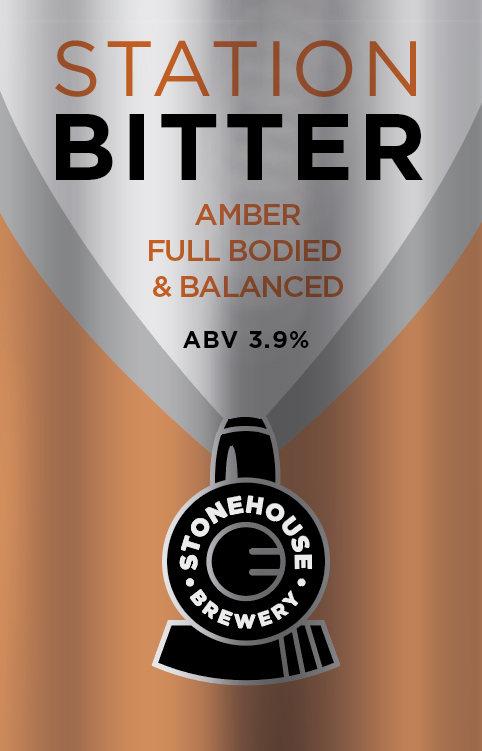
Best seller: Stone Station Bitter
Unlike many fledgling brewers, Shane and Alison had boldly decided to stick with a core range, ensuring quality. Station Bitter is still their best seller. With antipodean irony, Shane describes it as a traditional “brown boring bitter”. Yet it is, he tells, the most difficult ale to brew, the trick being to achieve the right subtle balance of sweetness and fruity bitterness from crystal and chocolate malts, and Bobeck and First Gold hops.
However, Stonehouse is no stranger to adventure. For Zaffir (4% ABV)) Shane sought the help of the Yakima Valley to source Pekko and Ekuanot hops, with floral and citrus notes. This is not mega-hoppy, in-your-face beer. That’s not the Stonehouse way. Drinkability remains key. Sunlander is another light blonde session ale brewed with Aussie hops, while Ballast Porter
is a rich porter with vanilla notes.
For the future more modern guest brews are in the pipeline — a berry porter, for Christmas, and a session IPA are on the cards. There could be new keg beers following the success of Palliser Bay (4.9% ABV), a properly lagered pilsner, and Adrift DDH, brewed with UK Cascade and Jester hops to celebrate new British hops. Elevate cider is going strong, too, produced with their own apples supplemented with imports from Herefordshire.
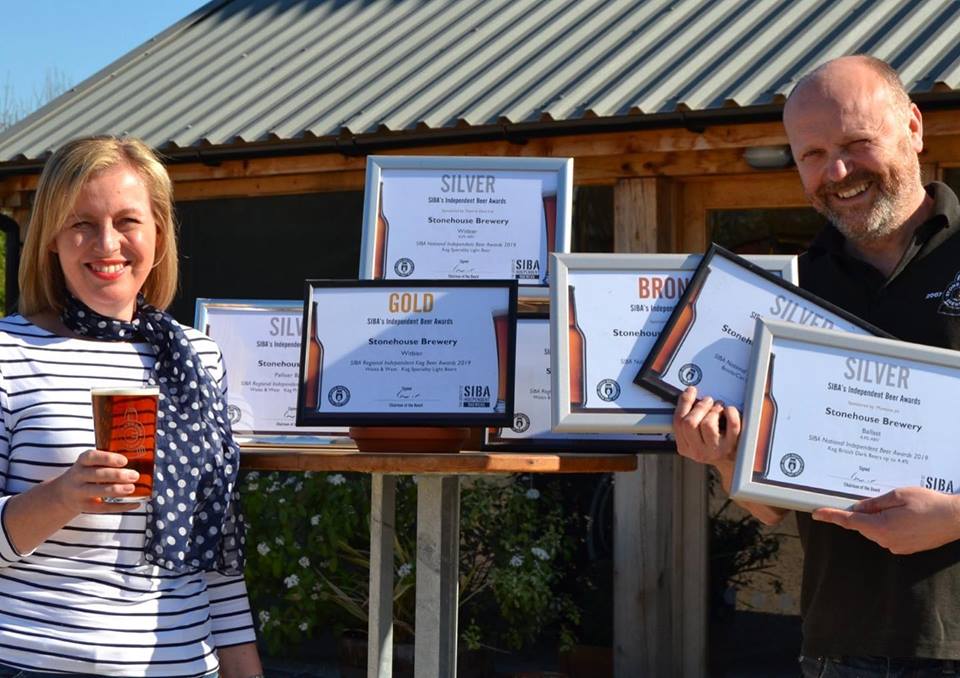
Alison and Shane with a selection of their awards
Stonehouse has won many accolades from the Society of Independent Brewers (SIBA), one year taking eight awards in the West and Wales region, while Station Bitter has claimed the SIBA national gold for standard bitters. In 2019, Kelly Point IPA won three CAMRA awards.
In the early days, Shane and Alison used their former freight sales expertise to push distribution around the North West, Wales, the Midlands, and even London. Then they took the strategic decision to stay local — delivery within 30 miles. It has paid off. Such was the post-lockdown thirst for their beers that on one July weekend they hosted 200 socially distanced guests.
The business remains a strong family affair, too, with both sons working part time. Euan (17) helps in the kitchen. A computer whizz, he is also building a beer and food ordering app. Finn (16) works front of house, but, as a fledgling engineer, he can often be found in the workshop with Iain.
Shane and Alison recognise the many challenges ahead to survive and thrive, including the threat of small brewers’ relief revision, suddenly announced like a bolt from the blue during the pandemic turmoil. Stonehouse sits a little perilously just under the 5000hl tax relief bar. Then there is still covid-19.
‘A huge challenge’
Shane says: “You have to take it seriously. We did our risk assessment and wrote up our plan, without being too authoritarian. We limited the number of bookings and had dedicated time slots for the barbecue. People responded. Covid has been a huge challenge, but you should not be in business if you become negative with setbacks. If you get a kick in the guts, you have just got to pick yourself up and stick at it.
“We had a really good July, one of the best ever. Our cask ale sales are rising again and we are still selling bottles. We are grateful for support from Shropshire Council and we are further investing, with £80,000 spent on the new kitchen, although we don’t want to be a restaurant. We have constantly tried to put money back in, sometimes borrowed a bit more than we wanted to do. Now we are a long way from the old chicken shed days.”
Next Easter, the extended Cambrian Restoration Railway is due to pull in at Weston Wharf, right alongside the brewery, bringing lots of visitors. Yes, it looks like Stonehouse will continue to steam up for some years yet.
In the meantime, watch Stonehouse’s Twitter page for details of take-away deals during lockdown.
• Steve Hobman is the man behind Beer Tours UK — discover the hidden delights of British brewing

